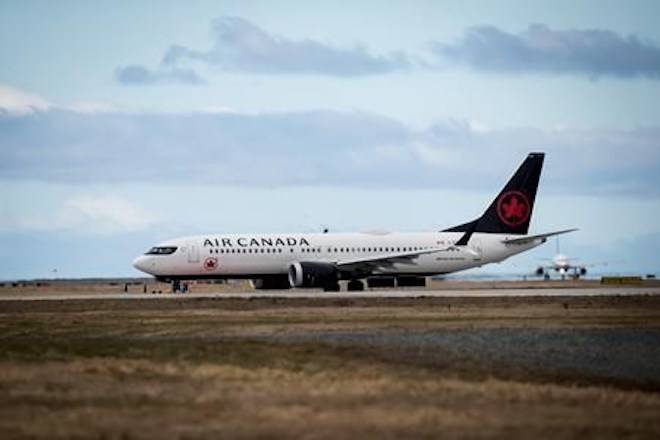Canada’s two largest airlines have at least one of the optional safety features on their Boeing 737 Max 8 aircraft that were reportedly lacking on the jets that crashed in Ethiopia and Indonesia.
Air Canada and WestJet Airlines both say they purchased disagree lights used by the aircraft’s software system during flight to avert stalls.
The New York Times has reported the Ethiopian Airlines and Lion Air jets involved in recent fatal crashes were not equipped with angle of attack indicators and disagree lights.
The safety features are not standard on the aircraft and are offered by Boeing as upgrades.
Air Canada spokeswoman Isabelle Arthur said the country’s largest airline purchased both safety features for its fleet of 24 Max 8 planes.
However, WestJet spokeswoman Morgan Bell said the Calgary-based airline’s 13 Max 8 planes are not configured with the angle of attack indicators.
She said the disagree light was purchased so the new aircraft will have common configurations with its Boeing 737 NG fleet.
Neither airline would disclose the cost of purchasing these options.
READ MORE: WestJet suspends 2019 financial guidance after Boeing 737 Max grounded
Neither Sunwing Airlines, which has four Max 8s, nor Boeing responded to requests for comment.
Norwegian Air, which is preparing to launch Canadian service to Europe on March 31, says it hasn’t added the optional extra because it is “not a critical safety feature nor is it a requirement by any aviation authority.”
“We are in close dialogue with Boeing and follow their and the aviation authorities’ instructions and recommendations, we immediately implement all safety recommendations as required,” stated acting chief operating officer Tomas Hesthammer.
The discount carrier said it is working on using other aircraft to cover the route but said it is too early to tell how the grounding of the Boeing planes will impact its operations in the coming months.
The safety indicators help pilots detect any erroneous readings from two vanelike sensors that determine the position of the plane’s nose relative to oncoming air.
The angle of attack indicator displays the readings of the two sensors while the disagree light is activated if the sensors don’t provide the same information, the U.S. daily said.
The MCAS system can automatically push the plane’s nose down to prevent stalling if it determines it is pointing up at a dangerous level.
The New York Times also said, citing unnamed sources, that Boeing will soon update the MCAS software and make the disagree light standard on all new 737 Max planes, but maintain the angle of attack indicator as an option.
Boeing is rushing to complete the upgrades on jets by early next week, according to a person familiar with the changes.
The person spoke on condition of anonymity because Boeing and federal regulators are still discussing details of the upgrade to the Max fleet, which was grounded worldwide after a second deadly crash this month in Ethiopia.
The causes of the Ethiopian Airlines crash on March 10 and the Lion Air crash five months earlier, both on takeoff, are being investigated. Investigators are looking at whether a new software system added to avoid stalls may have been a contributing factor.
READ MORE: Air Canada grounds its Boeing Max 8s until at least July 1 to provide certainty
Air Canada has removed its grounded Boeing 737 Max 8 jets from service until at least July 1 in order to provide more certainty for passengers who wish to book flights in the coming months.
Both Air Canada and WestJet have suspended their 2019 financial guidances.
— With files from The Associated Press
Ross Marowits, The Canadian Press



